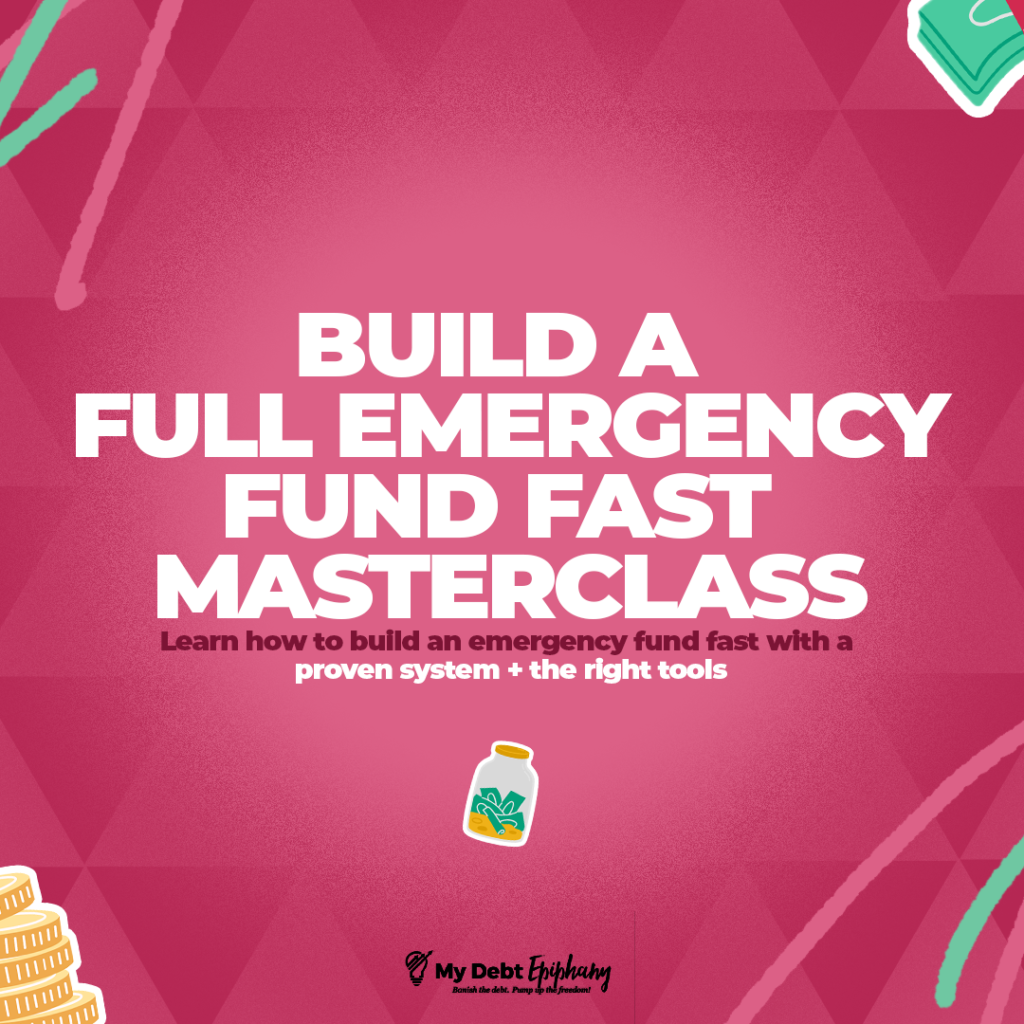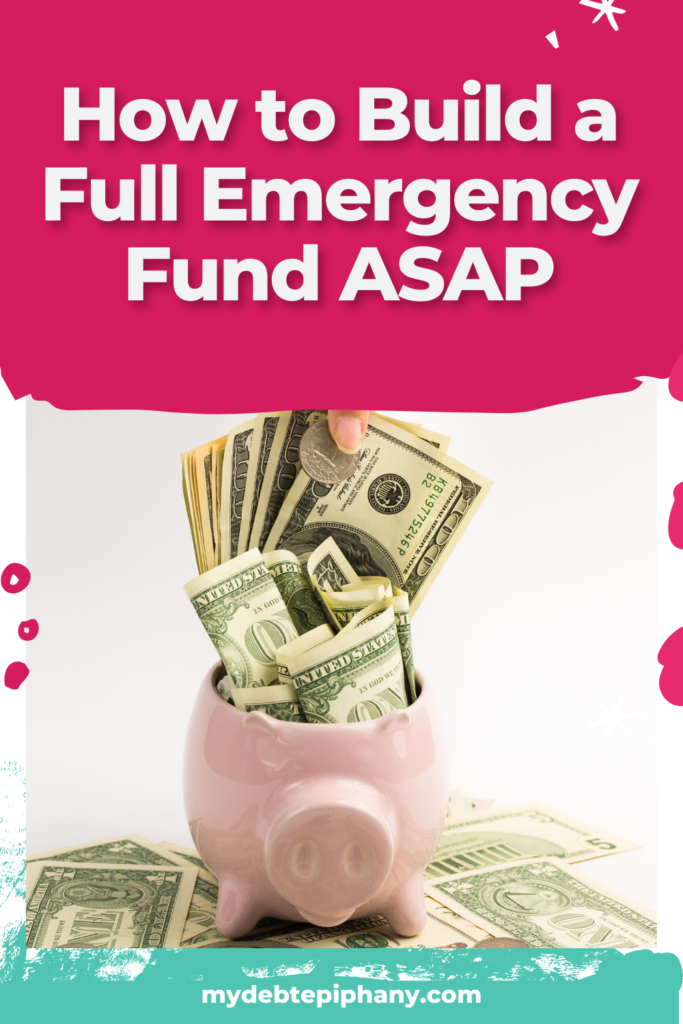Over the years, I heard a lot of people recommend that having a small emergency fund of $1,000 or so is enough. Personally, I’ve never felt comfortable with a baby emergency fund. While saving something is better than nothing, $1,000 is not enough for most people when a true emergency hits.
Recently, I had to get my car fixed and the total came to $1,400. If my emergency fund was just $1,000, I would have had to use a credit card or figure something else out.
The importance of having a full emergency fund can’t be denied. It can give you the freedom and flexibility you need to make important decisions when life happens.
You don’t want to have to tap into your retirement savings or max out your credit cards for an unexpected surgery or hospital stay. Here’s why you can benefit from having a full emergency fund and how to create one.
What is a Full Emergency Fund?
A full emergency fund is not 3 to 6 months of your salary. It’s 3 to 6 months of expenses. If you lose your job or come up against another kind of emergency, you should be able to cut a lot of expenses from your monthly budget.
If you bring home $5,000 a month but can live on $3,000, then use $3000 a month as a basis for determining the amount of your emergency fund.
Deciding whether to fund your emergency fund for three months, six months, or somewhere in between can get tricky. If you’re a single person with no children, a stable job, and a rented apartment, you’re probably safe with 3 to 6 months’ worth of expenses.
If you’re the sole breadwinner for a family of four, with a mortgage and a fluctuating income from your sales job, you’re going to want to set aside more in the bank. Trust me on this one. Even now after experiencing this pandemic, I think people want to save even more to feel safe. Ultimately, you should settle on the amount that you feel comfortable with.
Related: Emergency Fund Tips: How to Grow Your Account Fast and Where to Start
Where Should You Park Your Full Emergency Fund?
You want your emergency fund to be easily accessible. I prefer to keep my emergency fund in my Capital One 360 savings account. It fetches a competitive interest rate, and I have it attached to my checking account for easy access via a quick transfer on the computer and an ATM card.
CapitalOne 360 is my absolute favorite online bank and I’ve been using it for years to house my emergency fund. You can check out my review of CapitalOne 360 here and if you sign up for an account here, you could earn a $100 bonus.
Keeping your full emergency fund in a money market account is also acceptable. The main point is that your money should be accessible to you as soon as you need it, without penalty.
Though some people suggest that using a HELOC (home equity line of credit) for an emergency fund is a good idea, I don’t like it.
When you’re in the midst of an emergency, I don’t like the idea of taking on more debt. I also think that it’s psychologically more difficult to spend cash that you’ve worked really hard to save, rather than a line of credit, where all you have to do is sign on the dotted line. And that’s a good thing when you don’t have a large cash flow.
You don’t want to look at your emergency fund as an endless supply of cash for your need to redecorate the house. You want your attitude to be one of disdain to spend the money in any event, but a true emergency.
What Constitutes an Emergency?
Well, it’s not a new flat-screen TV. And it’s not a new wardrobe because your old wardrobe is out of style. And it’s not a $1,000 stroller for your baby.
A true emergency is something that interferes with your life, your health, or your ability to pay the bills. Hospital stays, disability, and loss of a job, and even your car breaking down and preventing you from getting to work are all true emergencies.
If you aren’t having a true emergency, DON’T TOUCH YOUR EMERGENCY FUND!!!
Related: How to Save Your First $1,000 This Year
Having Trouble Coming Up With a Fully Funded Emergency Fund?
I know how hard it can be to save 3 to 6 months of expenses when you feel like you’re barely scraping by and have little to spare for your emergency fund.
However, building up a full emergency fund is not an option or a luxury, it’s a MUST! Change your mindset to view having an emergency fund as non-negotiable. Then, take steps to lower your expenses and increase your income.
It’s the only way to create a large enough wedge between your spending and income so you can be able to set aside money for unexpected expenses. If you have a partner, split up the burden and set a goal to hit your emergency fund target in a reasonable amount of time.
If you’re looking for ideas to help you save, this post will show you how to save money in various different categories of your life.
This post lists 5 Legitimate Ways to Make an Extra $1,000 Per Month and there is something for everyone to try regardless of what your skills or interest are.
To help even further, I’ve put together a 4 part masterclass called Build A Full Emergency Fund…FAST and it’s dedicated to all things emergency fund! We’ll dive into all the areas needed to get your emergency fund to where you want it to be fast.

We’ll discuss things such as your personal ‘why’ for building a full emergency fund, what you should and shouldn’t use emergency savings for, how many months of expenses you should set aside for your own personal situation and SO much more. I am also including great bonuses that will help you beyond the masterclass. Join the masterclass here!

What do you think about emergency funds? Do you have one? How much is enough? Where do you park yours?
Stop Worrying About Money and Regain Control

Join 5,000+ others to get access to free printables to help you manage your monthly bills, reduce expenses, pay off debt, and more. Receive just two emails per month with exclusive content to help you on your journey.

Emergency funds are so difficult, especially for people looking to pay down debt or who have a lot of “new” expenses (i.e. have a baby for the first time, trying to buy a house, etc.). I will say building an emergency fund was the best finance move I made, even better than paying down student loans. Having that cash sitting in my account in case of an emergency helps me sleep better at night.
Very true, it can be hard to get your emergency fund started in the beginning but it’s so worth it in the end because you’ll have more peace of mind. You just have to prioritize building your savings over other things until you get your account balance to an amount that you’re comfortable with.
I have an ok emergency fund. I need to add more to it, but it’s a struggle right now.
I hear ya! Just start small and be consistent.